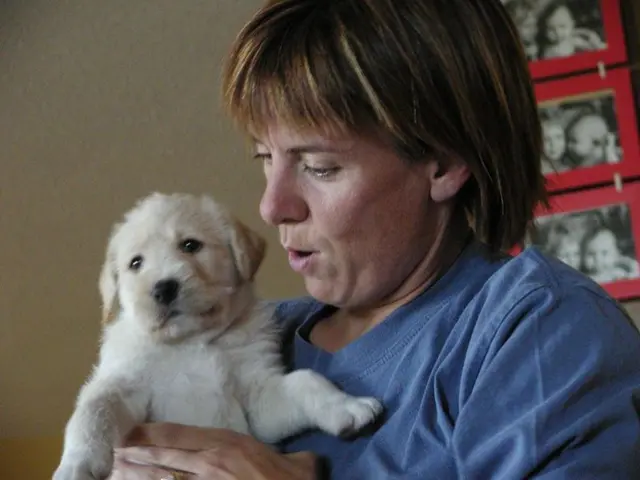Comprehensive Guide to Puppy Vaccinations: Ensuring Your Dog's Health and Wellness
Protecting your pup from harm is crucial, and one of the essential steps is giving them the right vaxxes. Young canines are highly susceptible to various contagious diseases that can make them sick or worse, lead to their demise if left unchecked. By following a vet-approved vaccine schedule and partnering closely with your vet, you'll help strengthen your pup's immune system, preparing them to thrive into adulthood.
Get ready to dive into the nitty-gritty of vaccinations! We'll discuss why vaccines matter, the core vaccines your bundle of fur needs, and the non-core options that may come in handy based on their environment and lifestyle. Remember, this guide is your roadmap to keeping your four-legged buddy safe from life-threatening illnesses.
First off, why the fuss about vaccs?
Vaccinations expose a pup's immune system to tiny, weakened or inactive versions of viruses or bacteria. This process allows the body to recognize and fight off these pathogens more efficiently should they encounter them in the future. At this stage, a pup's immune system is still developing, so it relies heavily on maternal antibodies in the early weeks, which fade over time. That's where vaccinations step in to build long-term immunity.
Developing an immunity army through vaccinations has several advantages:
- Shield your pup against common diseases: Get ahead of serious illnesses like parvovirus and distemper by vaccinating on time.
- Save your wallet from expensive medical bills: Avoid expensive treatments for preventable diseases that can leave you and your pup emotionally drained.
- Safeguard your community: By preventing illness in your pup, you're protecting other dogs and sometimes even people from infection.
- Follow rules and regs: Many regions require vaccinations, particularly rabies, by law. Proof of vaccination is usually necessary to secure a license.
Now that you're informed about what vaccinations do, let's delve into which ones are essential for your pup. The veterinary world divides vaccines into two main categories:
Core Vaccines
These vaccines are mandatory for all puppies, regardless of breed, lifestyle, or location. They protect against highly contagious, severe diseases, including:
- Canine Distemper
- Parvovirus (CPV)
- Adenovirus (Canine Hepatitis)
- Rabies
Non-Core Vaccines
These are optional vaccines that vets may recommend based on factors like puppy environment, lifestyle, and risk factors. While not mandatory for every dog, they can be crucial in specific situations. Examples include:
- Bordetella bronchiseptica (kennel cough)
- Leptospirosis
- Canine Influenza (Dog Flu)
- Lyme Disease
Your vet will determine whether non-core vaccines are suitable for your pup depending on factors like travel, exposure to wildlife or other dogs, and local disease prevalence.
Let's get down to the nitty-gritty of each core vaccine:
1. Canine Distemper
- What it is: A viral disease that affects the respiratory, gastrointestinal, and nervous systems.
- Why it's dangerous: Highly contagious and often fatal; no specific cure.
- Symptoms: Coughing, fever, nasal discharge, diarrhea, seizures, potential neurological damage.
2. Parvovirus (CPV)
- What it is: A highly contagious viral infection attacking the digestive and immune systems.
- Why it's dangerous: Lethal for puppies; can survive for months in the environment.
- Symptoms: Vomiting, severe diarrhea (often bloody), lethargy, and dehydration.
3. Adenovirus (Canine Hepatitis)
- What it is: A viral infection primarily affecting the liver, but also impacting the kidneys and eyes.
- Why it's dangerous: Can lead to chronic liver disease or acute liver failure.
- Symptoms: Fever, vomiting, loss of appetite, abdominal pain, jaundice.
4. Rabies
- What it is: A viral disease affecting the central nervous system, transmissible to humans.
- Why it's dangerous: Almost always fatal once symptoms appear; required by law in many areas.
- Symptoms: Behavioral changes, aggression, drooling, paralysis, eventual death.
Now, let's chat about non-core vaccines, which are useful in specific circumstances.
1. Bordetella bronchiseptica (kennel cough)
- What it is: A bacterial infection causing upper respiratory symptoms.
- Risk factors: Dogs frequenting kennels, dog parks, groomers, or daycare facilities.
- Symptoms: Persistent cough, nasal discharge, sneezing, possible loss of appetite.
2. Leptospirosis
- What it is: A bacterial disease that can affect the liver and kidneys; transmissible to humans.
- Risk factors: Areas with standing water, wildlife, or rodent exposure.
- Symptoms: Fever, vomiting, muscle pain, jaundice, potential kidney/liver damage.
3. Canine Influenza (Dog Flu)
- What it is: A contagious respiratory virus, often spreading in places where dogs come together.
- Risk factors: Boarding facilities, dog shows, urban dog parks.
- Symptoms: Cough, runny nose, mild to high fever, lethargy, reduced appetite.
4. Lyme Disease
- What it is: A bacterial infection transmitted by ticks (particularly Ixodes ticks).
- Risk factors: Geographic areas with high tick populations, outdoorsy lifestyles.
- Symptoms: Joint pain, fever, general malaise, possible kidney complications.
To wrap things up, here's a typical vaccination schedule for puppies. Your vet may tweak this based on factors like breed, age, health status, and local disease prevalence:
- 6–8 weeks: First round of vaccinations.
- 10–12 weeks: Second round of vaccinations.
- 14–16 weeks: Third round of vaccinations, including rabies.
Pups usually need multiple doses of the same vaccine spaced a few weeks apart to ensure full immunity. Neglecting or delaying boosters can leave them susceptible to infections.
Here are some tips for a smooth vaccination process:
- Planning: Schedule vet appointments in advance and keep track of boosters.
- Stay calm: Pups can sense your anxiety, so remain upbeat and soothing to keep them relaxed.
- Rewards: Offer treats or gentle praise before and after shots to create a positive association.
- Monitor side effects: Mild reactions like lethargy or soreness are normal; severe reactions like swelling, repeated vomiting, or difficulty breathing require veterinary attention.
- Follow Up: Keep up with check-ins and boosters for complete immunity.
Got questions? Check out these Frequently Asked Questions:
Q1: Can I just vaccinate my pup once and be done?
A1: No. Pups need multiple vaccine rounds for their immune systems to fully recognize and defend against diseases. Booster shots reinforce immunity and ensure long-term protection.
Q2: Are in-home vaccines safe?
A2: Administering vaccines at home carries risks. Improper handling, storage, or injection technique can reduce vaccine efficacy or cause harm. It's safer to let a vet handle vaccinations and detect allergies or other issues.
Q3: Why does my pup need a rabies shot if they're an indoor pet?
A3: Rabies is nearly always fatal and can spread to humans. Most places require rabies vaccination by law, regardless of a pet's indoor/outdoor status.
Q4: Do small breeds need fewer vaccines than large breeds?
A4: Breed size doesn't affect core vaccine requirements. All pups, regardless of size, need protection against dangerous diseases. However, vets may adjust how and when doses are administered based on a pup's age, health, and individual needs.
By following a consistent vaccination schedule, you'll set your pup on the path to a healthy, happy life with strong immune defenses. Keep an eye on their vaccinations, overall health, and consult with a trusted veterinarian for advice. In doing so, you'll help ensure your pup stays safe from illnesses and enjoys life to the fullest!
- Vaccinations help develop an immunity army in puppies by exposing their immune system to weakened or inactive versions of viruses or bacteria, preparing them to fight off pathogens more effectively should they encounter them in the future.
- Core vaccines, such as Canine Distemper, Parvovirus (CPV), Adenovirus (Canine Hepatitis), and Rabies, are mandatory for all puppies and protect against highly contagious, severe diseases that can be life-threatening or require costly treatments.
- Non-core vaccines, like Bordetella bronchiseptica (kennel cough), Leptospirosis, Canine Influenza (Dog Flu), and Lyme Disease, may be optional but are crucial in specific situations, depending on factors like travel, exposure to wildlife or other dogs, and local disease prevalence.
- Maintaining a consistent vaccination schedule, plan appointments in advance, stay calm and reassuring during shots, monitor side effects, follow up for booster shots, and consult with a trusted veterinarian for advice will help ensure your pup stays healthy, safe, and protected from various diseases.








